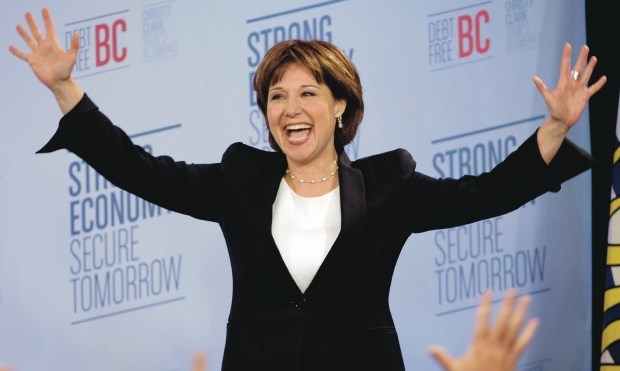B.C.’s two main political parties are digging themselves out of debt after a hard-fought, multimillion-dollar May provincial election campaign, financial records show.
Both the B.C. Liberal Party and B.C. NDP took out loans and lines of credit to finance their election war chests, with millions still owing to banks and credit unions.
The NDP, which spent $9.4 million in the lead-up to the May 14 election, has $1.9 million in outstanding loans to three credit unions, say Elections B.C. financing records released Monday.
“That’s manageable for us,” said party president Moe Sihota. It’s similar to NDP debt after the 2009 election.
The Liberals, who spent $11.7 million, ended the election with $3 million owing to four banks.
“That’s standard practice for us,” said Mike McDonald, Liberal party executive director. The Liberals were almost $6 million in debt after the 2009 provincial election, and took until December 2012 to pay it off.
“It was an experience many of us in the provincial executive didn’t want to go through again,” McDonald said.
“We did a good job controlling costs and fundraising and that allowed us to bring the amount required to a much lower level.”
The Liberal debt “will be paid off well in advance of the next election,” McDonald said. The party won re-election and increased its majority in the legislature.
The newly released financial records paint an interesting picture of the finances behind the 2013 election.
The NDP out-fundraised the Liberals, pulling in $9.7 million compared to the Liberals’ $8.5 million. But the Liberals outspent the NDP by more than $2 million.
NDP leader Adrian Dix had dedicated considerable time to courting B.C. business leaders, and it appeared to pay off. Corporations donated $2.15 million to New Democrats, compared to $226,530 in 2009. Businesses went from contributing four per cent of the NDP’s campaign war chest to 22 per cent in 2013.
The NDP team was successful in showing corporate leaders there was little to fear from New Democrats, Sihota said.
“Our objective was to try and have a relative balance between corporate and labour donations,” Sihota said. “The numbers are pretty close.”
He said the party has reached out to many corporate donors since the election and they still see value in a relationship with an Opposition NDP.
The Liberals had accused the NDP of trying to extort money from businesses, through a letter campaign that targeted Liberal-friendly corporations and encouraged them to balance their political leanings with a donation to the NDP.
Union donations, which have traditionally fuelled the NDP, were $2.5 million compared to $2 million last election. The Liberals received $6,010 from unions.
The Liberals continued to draw the bulk of party financial support from corporations, which pitched in $5 million in 2013, down from almost $6 million in 2009.
The NDP had promised, if it formed government, to ban union and corporate donations to political parties. Financial records show such a move would wipe out almost half the money raised by both parties during the election.
The B.C. Green Party spent $180,245 and ended the election with a $15,000 loan from John Sterk, husband of Green Party leader Jane Sterk, who loaned the money on behalf of an estate donation. Most of the Green donations were from individuals.
The B.C. Conservatives spent $154,837, mostly raised from corporations.



